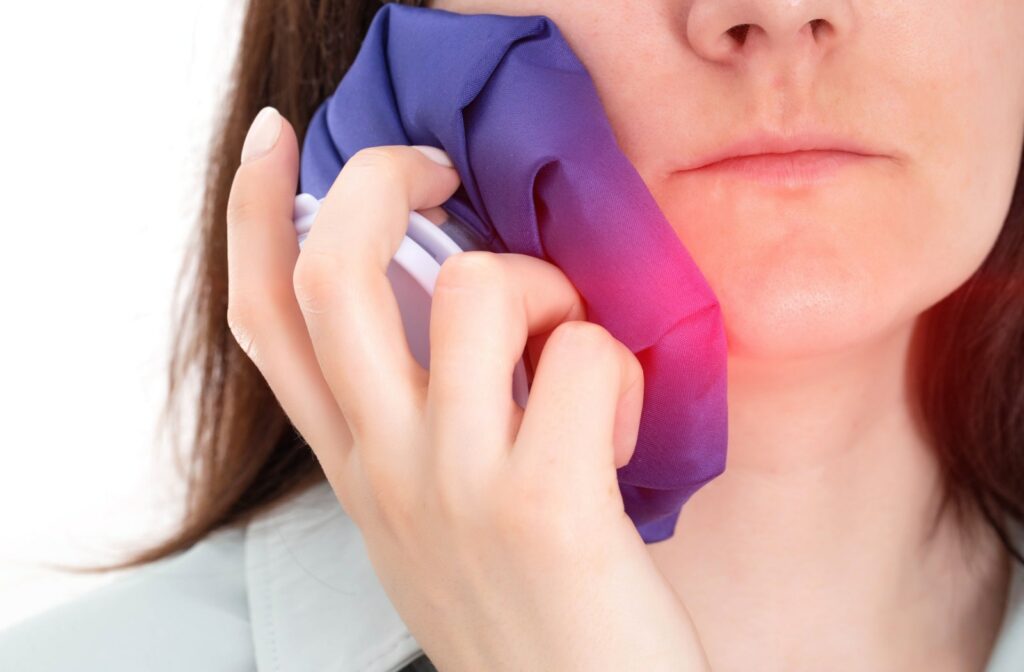TMJ stands for temporomandibular joint, and this joint can experience issues like temporomandibular disorder (TMD).
TMJ issues can be uncomfortable, causing teeth to hurt along with jaw pain, difficulty chewing and swallowing, or headaches and facial pain. Fortunately, it’s often a treatable condition. But effective treatment varies based on the severity of the condition and its causes.
Your dentist can help you get to the source of the problem with a dental exam, and they can offer advice on how to find relief from the sometimes painful symptoms of TMJ.
What Is TMJ?
Temporomandibular joint disorder (TMD) refers to a disorder that affects the jaw joint responsible for opening and closing the mouth—called the TMJ. This joint connects the lower jaw to the skull and is located in front of each ear. TMD is a broad term that encompasses various conditions that cause pain and dysfunction in the TMJ and its muscles.
What Causes TMJ Disorders?
Several factors can contribute to the development of TMJ disorders. A common cause is muscle tension and stress, which can lead to jaw clenching or teeth grinding. Trauma to the face or jaw, such as an impact injury or dislocation, can also trigger TMD. Arthritis and other inflammatory conditions can damage the joint and cause pain and stiffness. Poor posture, chewing gum, and eating excessively hard or chewy foods can also strain the jaw muscles and lead to TMD.
Symptoms of TMD
Signs and symptoms of TMD vary from person to person and can include:
- Jaw pain or stiffness
- Clicking or popping sounds when opening and closing the mouth
- Difficulty or pain while chewing
- Lockjaw (the inability to open or close the mouth)
- Headaches and facial pain
Can TMJ Cause Teeth to Hurt?
One possible explanation for tooth pain from TMD is that the inflammation and irritation in your jaw joint can radiate to other parts of your head and neck, including your teeth. Plus, clenching or grinding your teeth due to TMD-related pain can cause tooth sensitivity and discomfort. TMD can also cause your teeth to shift or become misaligned, which can result in discomfort.

Treating TMD
TMD treatment ultimately depends on what’s causing the tension and pain in your jaw.
Identify & Eliminate Trigger Factors
An initial step in managing TMD is identifying factors that trigger pain or discomfort. It could be stress, specific foods, or a particular medication. You can keep a symptom diary to help keep track of your triggers. Discuss with your dentist to identify the cause and develop a plan to avoid these triggers.
Use Hot & Cold Therapy
Ice and heat can help reduce TMD pain and inflammation. Apply a cold compress to your jaw for 10–15 minutes, 3–4 times a day. Later, switch to a warm compress to relax your jaw muscles. This therapy can be done twice a day or as needed. Repeat this simple process to help relieve TMD pain.
Exercise the Jaw Muscles
Strengthening your jaw muscles can reduce the frequency of TMD pain and headaches associated with it. Gently stretch your jaw muscles by opening and closing your mouth a few times a day. You can also perform side-to-side jaw movements and push your tongue to the roof of your mouth while slowly opening your mouth.
Seek Professional Help
TMD can be a complex condition to manage. If home remedies do not alleviate the condition, you should seek medical attention. Your dentist may recommend a physical therapist who can help relieve your TMJ pain with specific exercises and stretches to help improve jaw movement.
An oral surgeon or dentist can also evaluate your condition and recommend medical treatment if necessary. Orthodontics or surgery may be an effective solution to treating TMD.
Practice Self-Care Routines
Stress management techniques like breathing exercises, yoga, and mindfulness meditation can help reduce TMD symptoms. You can learn to relax your jaw muscles and rest your face and chin to prevent clenching.
Additionally, you can practice good oral hygiene by brushing and flossing regularly, maintain a balanced diet, and avoid hard and sticky foods that can affect your jaw motion.
Discuss Your TMD Symptoms with Your Dentist
Dentists have been the primary medical professionals who offer safe and effective TMD treatments for many years. Make an appointment with your dentist if you’re experiencing uncomfortable TMJ symptoms that don’t go away after trying home remedies.
Book an appointment at Upper Gage Dental Centre in Hamilton today. Our team is happy to answer your questions and book you in to see one of our experienced dentists.



